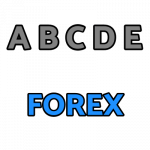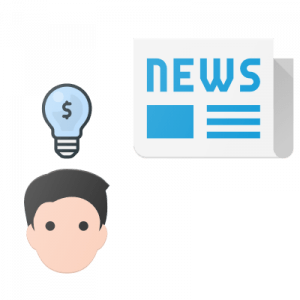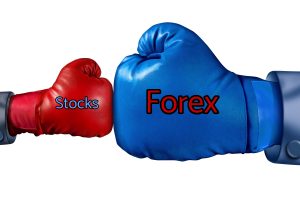Forex Basics
Contents
Getting into online Forex trading can be confusing at first, but this does not change the fact that it is still one of the best markets to trade on. There are a ton of terms and definitions floating around in the currency market trading community, and almost all of them are what traders should understand and use in their own trading. The reason is quite simple, just having knowledge of the basics of Forex trading, will not get you too far as you’ll definitely be met by a brick wall of terms you don’t understand. In order to become a successful Forex trader, you need to consider and understand a slew of terms and strategies a casual participant in the market will only have very basic knowledge of. You should also try to research how the most successful Forex traders in the world operate and learn from them.
To help you learn these terms and what they mean, as well as to find out if Forex trading is profitable and is your cup of tea at all, we have created a glossary and some tips for you to consider.
Key Forex Terms
Appreciation
The increase in the value of a currency’s fx rate
Ask
The price at which the market sells a currency. Also known as the ‘offer’. This is the price at which you can buy the currency.
Base Currency
In a currency pair, this is the currency that the other currency is being compared to. For example, in EUR/USD, the base currency is the euro. Thus, a rate of 1.500 for EUR/USD means a euro is worth 1.5 dollars.
Bear
Symbol of a down market. Negative expectations for a market or currency’s value are “bearish”.
Bid
The price at which the market buys a currency. This is the price at which you can sell the currency.
Bull
Symbol of an up market. Positive expectations for a market or currency’s value or “bullish”.
Carry
How much it costs a trader to hold onto a currency position overnight, due to the difference in interest rates between the two currencies in a pair. Can also lead to profits.
Chart
The basic, fundamental tool of technical analysis. A chart tracks the movements of a currency’s value over a period of time. Types of charts include candlestick, bar, and line, each with its own advantages and disadvantages. There are several charts that are especially important, such as the RSI indicator chart, ADX indicator chart or one of the easiest ones to use, the Accelerator Oscillator Indicator.
Currency Pair
One base currency and currency it is being compared to. EUR/USD is the most commonly traded currency pair.
Currency Symbols
The international, three-letter system of identifying a currency. The main symbols are:
- EUR: Euro
- USD: U.S. Dollar
- GBP: U.K. Pound (“Sterling”)
- JPY: Japanese Yen
- CAD: Canadian Dollar (“Loonie”)
- AUS: Australian Dollar (“Aussie”)
- NZD: New Zealand Dollar (“Kiwi”)
- CHF: Swiss Franc (“Swissy”)
Depreciation
Fall in the value of a currency
Devaluation
Move by a government central bank to lower the value of its currency
ECB
European Central Bank. Central Bank of the European Monetary Union
Federal Reserve
The central bank of the United States. Also known as “The Fed”
Leverage
The ability to control larger amounts of currency than what is invested. Commonly referred to by ratios, such as 50:1 (50 units of currency for every unit invested). But don’t make the welcoming nature of leverage confuse you as this Forex basic strategy is connected to as many cons as it is to pros. Cons that you need to know how to avoid.
Margin
Borrowing funds from a broker to buy more currency and gain leverage. This is a bit tricky as not many traders know how to exactly utilize the feature and end up harming themselves rather than benefiting.
Pip
The smallest common unit of change in a currency’s value. One pip is equal to 1/100th of one percent (at the fourth decimal point). If a currency is at 1.5000 and moves up to 1.5001, the gain is one pip. A pip with the yen is at the second decimal place, not the fourth.
Principal
The amount of money invested in a trading account
Range
The difference between the highest point and lowest point of value reached in a trading session by a currency.
Resistance
A technical point at which a currency is expected to receive selling pressure (i.e. the upper limits of a currency’s expected gains)
Rollover
the term Rollover generally refers to a change made to the value date of a Forex transaction that is usually done to extend the settlement of the trade further out in time.
Spot Price
The current price at which a currency trade is fulfilled within two days
Spread
The difference between the ask and bid price for a currency. This could be tricky as there’s also a term called Spread betting, which is a similar but a still different understanding. You might also want to learn a little about direct and indirect quoting.
Support
A technical point at which a currency is expected to receive buying pressure (i.e. the lower limits of a currency’s expected losses)
Swap
a two-part transaction in which a trader closes out a Forex position for one value date and opens one of a similar magnitude for another value date.
Forex Basics for beginners and what you need to know
 Since we’ve already covered the major terms of Forex trading, let’s get into the very basics of starting out and making it worth your time. You see, just knowing these terms is not going to get you far as well. Yes, I know you’re already cringing about the fact that you have to know so much. But it honestly doesn’t take as much time as you may think, the basics of knowing how to base your Forex trades will be deep within your brain after a week of learning and another week of trading.
Since we’ve already covered the major terms of Forex trading, let’s get into the very basics of starting out and making it worth your time. You see, just knowing these terms is not going to get you far as well. Yes, I know you’re already cringing about the fact that you have to know so much. But it honestly doesn’t take as much time as you may think, the basics of knowing how to base your Forex trades will be deep within your brain after a week of learning and another week of trading.
Avoid these mistakes
![]() There are quite a lot of mistakes that Forex beginners make, but some of them are so deadly to your experience that you need to actually go out of your way to avoid them. Let’s see what they are.
There are quite a lot of mistakes that Forex beginners make, but some of them are so deadly to your experience that you need to actually go out of your way to avoid them. Let’s see what they are.
- Trading Without a proper plan
- Not paying constant attention to your trades
- Not conforming to the trend
- Not diversifying
Obviously, there are way more mistakes that a beginner can make, but honestly, these ones are the most impactful in the beginning as they can seriously mess up your whole mindset about Forex.
Easiest ways to start out trading Forex
Forex basics are as it is implied in the name, basic. However, for a complete beginner, they are still depicted as the hardest thing in the world. Forex can definitely be learned through reading books, reading guides and watching some real time trades happen, but the most knowledge comes from experience itself. For example, you can start with a beginner’s account which is also known as a demo account, but at this point, you don’t have that emotional pressure that is so unique to a live account trade. Another thing you might need to do is to seek help from the Forex trading tools, that will make the whole process notably easier.
Arguably the best place to start off trading is a Micro account, which allows you trade for real money, on a very small scale, meaning that you won’t have a serious impact if your trades end up to be a loss. As a matter of fact, these accounts are quite diverse as well, because not only can you trade major currency pairs here (which are the most educational), but also minor currency pairs, which tend to be a bit more volatile, but harder to get info for. There are many types of currency pairs, but determining which one is best for you takes knowledge and experience, which you will have acquired through a minor account.
Forex trading basic tactics
 You probably already know that the price of currencies is very responsive to news articles. Why? Because the news may document an event that could potentially harm a currency in the future. For example, a news article may come out detailing info about a potential civil war happening in Poland. This will immediately prompt traders to sell their złoty (Poland’s currency), because a civil war typically depreciates the local currency, because of the uncertainty of who will win. Therefore, being very news-aware is something that can seriously boost your profits as you make every trade with assured confidence, thanks to your research. Another thing that might help you out a lot, is keeping an eye on the key economic indicators that define how the Forex market changes over time.
You probably already know that the price of currencies is very responsive to news articles. Why? Because the news may document an event that could potentially harm a currency in the future. For example, a news article may come out detailing info about a potential civil war happening in Poland. This will immediately prompt traders to sell their złoty (Poland’s currency), because a civil war typically depreciates the local currency, because of the uncertainty of who will win. Therefore, being very news-aware is something that can seriously boost your profits as you make every trade with assured confidence, thanks to your research. Another thing that might help you out a lot, is keeping an eye on the key economic indicators that define how the Forex market changes over time.
This tactic is probably the most utilized one as it doesn’t require too much investment and helps avoid a lot of risks. The news is something you would read regardless even if you weren’t trading, making it not so impactful on your daily agenda.
Forex basic trading techniques
There are quite a lot of techniques connected to Forex trading, however, they are not supposed to be confused with Trading orders as they are just a number of different variations a trade can be. For example, a stop-loss or a One Cancels the Other. Trading techniques are mostly associated with trading options as well, as identifying them is a bit of a hassle in itself.
Some of the most common trading techniques are trading Forex futures or even Spot Forex. The differences aren’t connected to the general understanding of the trade, they’re more connected to the location of the trader. Trading spot currencies differ from trading futures contracts because of the fact that spot currencies trade over a distributed telephone and electronic network, while futures contracts generally trade in a pit on a centralized futures exchange.
There are even people who opt for a completely different way of making trades, a way that is frowned upon by many members of the Forex trading community. The technique is called Binary Options, which you may have heard already. Because of the gambling nature of the technique,e it has been banned in many countries, Germany being the most recent one. Traders who choose this option are doing it on their own risks as most of the trades with this platform become a loss.
Forex tradespeople like you and me cannot access
Forex is a broad term, when I was just starting out in this industry, I thought that all of the prices and trades were determined by the traders sitting at their computers. However, I was wrong, oh so wrong. More than 90% of the trades which you and I don’t get to see with our Forex brokers is done on an institutional level. This means that large banks, companies and financial institutions also participate in the market, but on a much, MUCH larger scale, in the millions and billions actually. The core differences between interbank and online Forex trading is quite simple, online is for you and me as individual traders, and interbank is for large companies.
But…But… Aren’t stocks more popular?
 For a United States-states based trader, trading stocks is a lot more relevant than trading Forex. The reason being regulation of course. The US is known to be the most restrictive market in terms of Forex as it prohibits day trading, which is one of the most common ways to trade Forex. Most traders open a trade which they close on the same day or even the same hour.
For a United States-states based trader, trading stocks is a lot more relevant than trading Forex. The reason being regulation of course. The US is known to be the most restrictive market in terms of Forex as it prohibits day trading, which is one of the most common ways to trade Forex. Most traders open a trade which they close on the same day or even the same hour.
However, the core differences of stocks and Forex brokers are way beyond the trading techniques. There are more events at play here, like trading times, options and prices. In all honesty, there are a bunch of reasons why Forex is the best market to trade on. The basic understanding is this, do you have a lot of time on your hands? You can go for stocks but will have to conform to a country’s timezone where the stock exchange is located. Have limited time? Go for Forex as it is more adjustable to your schedule. Speaking about brokers…
Identifying your perfect broker
Brokers are the people that give us the opportunity to trade. In the past, before the internet was invented, the only form of Forex in the world was institutional, meaning that only banks were able to act as intermediaries, and they had quite a high minimum deposit ratio. A Forex broker is the creation of financial digitalization, which now helps people like you and me conduct our trades without serious interference.
But there are ways you need to choose your broker because there’s quite a lot of them. The best thing you can do is to check their trading interface, to look at how most of the trades on their platform go. Another way is to check how they actually generate income, are their spreads way too high? Do they have high commissions? Are they a Market Maker or an ECO? So on and so forth.
You get the picture, the broker is a service provider, not a commodity provider. So in order to truly see what they’re worth it’s important to see reviews about their services, trading frequencies and order processing skills.
And finally, the last tip I need to give you is to have the best internet connection you can possibly have in your region. The frequency at which prices change on the Forex market can be overwhelming as they are, but with a bad internet connection, it can become impossible to make a simple trade. My advice would be to go for a VPS, which assures that you will still be able to access the Forex market even if you are online or something serious happens to your computer. It basically guarantees that you will always be in the middle of the action.
If all of this seems a little intimidating, don’t worry, there is a fun way to get over the fear of trading. Check out these movies about trading, some of the best films ever made, and get yourself ready to trade with them.


























Comments (0 comment(s))